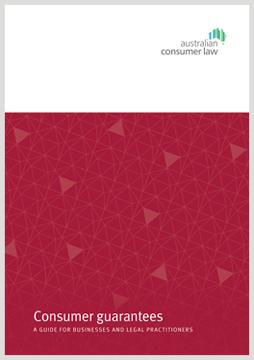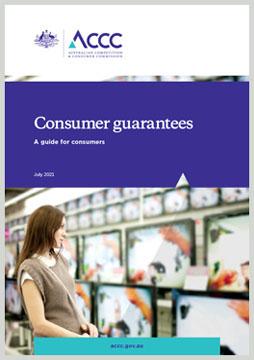On this page
How warranties and consumer rights are connected
Consumer guarantees are automatic and can't be negotiated away
Consumers have basic rights, known as consumer guarantees, when buying products and services. These rights are under the Australian Consumer Law.
Under the consumer guarantees, consumers are entitled to a repair, replacement, refund or cancellation if there’s a problem with a product or service. These consumer rights:
- apply automatically
- continue for a reasonable time depending on the product or service.
Warranties are voluntary and are additional to consumer guarantees
In addition to consumer guarantee rights, businesses can offer warranties.
Warranties can’t replace, change or take away a consumer’s basic rights. These basic rights can last longer than a business’s warranty.
A warranty is a voluntary promise that a person or business makes when selling a product or service. Once the consumer buys the product or service, the warranty becomes a legal right. Businesses must comply with any warranties they have provided.
The terms and conditions of a warranty may require the consumer to do certain things in order to keep the warranty.
Example
A warranty requires the consumer to have a product serviced once a year.
If the consumer doesn't do this they can no longer make a claim under the warranty when there’s a problem with a product.
But in this situation, the consumer still has their basic consumer guarantee rights, and can still ask the business to provide a remedy for a problem with their product under consumer law.
Types of warranties
The different types of warranties are:
- warranties about a product’s quality
- warranties against defects
- extended warranties or care packages.
1. Warranties about a product’s quality
When a manufacturer or seller makes extra promises about a product’s quality or standard, these are called express warranties or common warranties.
The promise may be made verbally or in writing, and may be about:
- a product’s quality, state, condition, performance or characteristics
- what it can do, and for how long
- the availability of servicing, parts or identical replacements.
Money-back guarantees and lifetime guarantees are both types of express warranties.
Consumers have a basic right that a manufacturer or supplier will comply with any express warranties they provide.
Example of an express warranty
A salesperson tells a consumer that the bookshelf they are buying can hold up to 100 kilograms.
This promise is an express warranty, so the bookshelf must meet this standard.
2. Warranties against defects
Extra promises about what a business will do if something goes wrong with a product or service are known as a manufacturer’s warranties or warranties against defects.
A warranty against defects is provided in addition to the consumer guarantees and does not limit or replace these rights.
The business may promise to:
- repair or replace a faulty product
- perform a service again, or fix a problem with it
- compensate the consumer.
A warranty against defects may be provided by the manufacturer or the business selling the product or service. It is given at or around the time the consumer buys the product or service.
Any written promise about what a business will do if something goes wrong can be a warranty against defects, even if it's not a formal document. For example, words on packaging or labels and terms in contracts can also count as warranties against defects.
Example of a warranty against defects
A consumer hires a tiler to renovate her bathroom. The contract says that the tiler will repair any tiles that become loose within 5 years of the tiling being done.
This promise is a warranty against defects.
How long the warranty against defects applies
Warranties against defects usually apply for a set amount of time. After the warranty expires, the consumer guarantee of acceptable quality usually still applies. This means that if there’s a problem with a product, the consumer likely still has a right to a repair, refund or replacement, even after the warranty period.
Businesses must not mislead consumers into thinking that their rights are limited to the remedies or timeframe set out in a warranty against defects.
What the warranty against defects must include
Warranties against defects must be written in language that is easy to read and understand.
They must include:
- the business’s name, address, email address and phone number
- what the consumer must do to entitle them to claim under the warranty
- information about how to make a claim under the warranty
- information about what the business will do when a claim is made
- how long the warranty lasts for
- who is responsible for any expenses associated with the warranty claim and how the consumer can claim back any expenses incurred
- that the benefits provided to the consumer by the warranty are in addition to other rights and remedies available to the consumer under the law
- the specific mandatory text stating that the warranty is in addition to the consumer guarantees and doesn’t exclude the consumer guarantees.
Businesses can include extra information in a warranty against defects, to explain how the Consumer rights and guarantees in the Australian Consumer Law apply. However, businesses must ensure that any extra information doesn't limit or negate the mandatory text.
The mandatory information must be available with the actual product. It is not enough to refer consumers to this information on a website or in-store.
Read our guides
Read more about the legal requirements for manufacturer’s warranties, also known as warranties against defects, in our guides on consumer guarantees:


3. Extended warranties
An extended warranty or care package extends the length of a manufacturer’s warranty.
Unlike manufacturer’s warranties, which are included in the sale of the product or service, extended warranties are usually sold separately for an extra cost.
The business supplying the extended warranty may also be a different business to either the manufacturer or the business selling the product to the consumer.
An extended warranty may or may not give a consumer any extra rights in addition to their automatic consumer guarantees rights under consumer law. Businesses should explain what an extended warranty provides over and above the consumer’s automatic rights.
Extended warranties are optional.
Businesses must not:
- pressure consumers to buy an extended warranty
- mislead consumers into paying for rights in an extended warranty that they already have automatically under the consumer guarantees.
Mandatory text that businesses must include
The law specifies the text that a business must exactly include.
Mandatory text for supply of goods
The mandatory text for the supply of goods is:
Our goods come with guarantees that cannot be excluded under the Australian Consumer Law.
You are entitled to a replacement or refund for a major failure and compensation for any other reasonably foreseeable loss or damage.
You are also entitled to have the goods repaired or replaced if the goods fail to be of acceptable quality and the failure does not amount to a major failure.
Mandatory text for services supplied after 9 June 2019
The mandatory text for the supply of services after 9 June 2019 is:
Our services come with guarantees that cannot be excluded under the Australian Consumer Law. For major failures with the service, you are entitled:
- to cancel your service contract with us; and
- to a refund for the unused portion, or to compensation for its reduced value
You are also entitled to be compensated for any other reasonably foreseeable loss or damage.
If the failure does not amount to a major failure, you are entitled to have problems with the service rectified in a reasonable time and, if this is not done, to cancel your contract and obtain a refund for the unused portion of the contract.
Mandatory text for goods and services supplied after 9 June 2019
The mandatory text for the supply of goods and services after 9 June 2019 is:
Our goods and services come with guarantees that cannot be excluded under the Australian Consumer Law. For major failures with the service, you are entitled:
- to cancel your service contract with us; and
- to a refund for the unused portion, or to compensation for its reduced value.
You are also entitled to choose a refund or replacement for major failures with goods.
If a failure with the goods or a service does not amount to a major failure, you are entitled to have the failure rectified in a reasonable time. If this is not done you are entitled to a refund for the goods and to cancel the contract for the service and obtain a refund of any unused portion.
You are also entitled to be compensated for any other reasonably foreseeable loss or damage from a failure in the goods or service.



